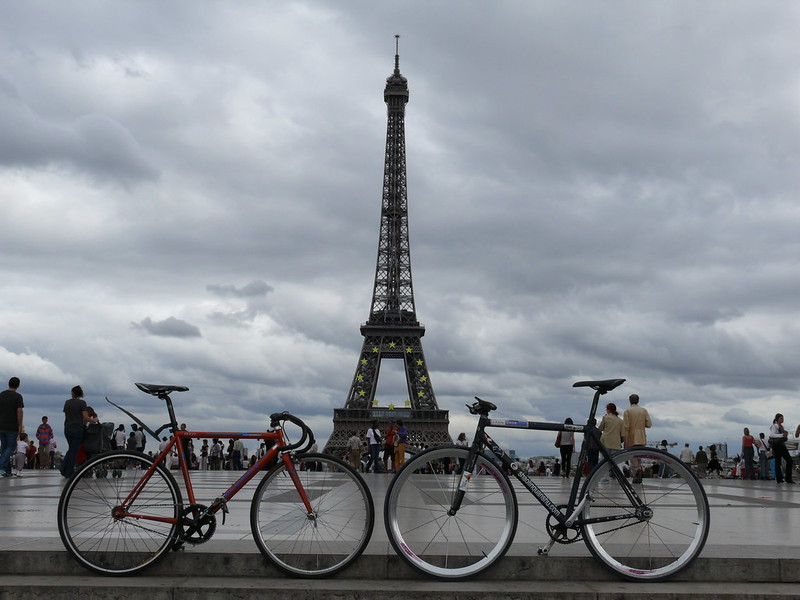City-bike share schemes have long been touted as an eco-friendly form of urban mobility, part of the sustainability package of any modern city. But has Paris’s adoption made it a greener city? And does bike sharing in general have genuine environmental benefits?
Paris is home to one of the biggest fleets of shared city bikes in Europe. The Vélib system (made from the words vélo (“bicycle”) and liberté (“freedom”) was launched in 2007. Its arrival coincided with that of Bicing in Barcelona, kicking off a boom in bike sharing in European cities and around the world. It was a huge hit as soon as it arrived, with 200,000 people registering as users within its first year. User rates remained high for a decade, until the “Velib fiasco” in late 2017 which saw the scheme switched over to another operator. The new management got into a big logistical mess, meaning that all of a sudden far fewer bikes were available and many docking stations were out of order. The number of Vélib’ subscribers and daily rides dropped off the charts. Four dockless bike-share schemes, all run by Asian operators, popped up across the city, hoping to snap up a share of the market. However, rampant theft and vandalism quickly caused the vast majority of them to pull out again (including Gobee, oBike and ofo) and bid the French capital adieu.
According to figures from the Vélib’ website, things seem to be picking up again and over 1,300 stations are open again. Average daily rides are up at around 100,000 trips a day after dropping to as low as 10,000 during the worst of times. However, the incident was a blow to Paris’s Mayor Anne Hidalgo’s ambitious plan to turn France’s car-congested city into the world’s cycling capital. Hidalgo’s “Plan vélo”, launched in 2015, aims to reduce pollution by taking cars off the streets, tripling the amount of bicycle travel and making the city 100% bicycle-friendly by 2020.
Cycling Sustainably in the City of Light
A whole host of different benefits has been ascribed to bike sharing schemes: including offering more flexibility when it comes to transportation options, reducing vehicle-related emissions, improving air quality, and reducing congestion and fuel consumption, as well as helping people save money. But how has the famous Vélib’ scheme fared in aiding Paris’s environmental ambitions? For a city that has long been dominated by car use and resulting pollution problems Vélib’ is promoted as one way to improve the city’s air quality. The Vélib’ website that states since the introduction of the bikes in 2007, “the City of Paris has seen a significant reduction in road traffic and urban pollution”. The Paris City Council has even raised the idea of making bike sharing free during pollution peaks in the city.
But unfortunately, according to a study from last year by the mobility research institute Forum Vies Mobiles, the scheme has actually had a low impact on motor vehicle use. Less than 5 percent of Velib’ users were motorists. Instead the bikes are mainly used by public transport users who wished to avoid the rush hour crush. The same has been seen in other cities, with multiple studies into usage showing that while bike sharing schemes have been shown to reduce car use in some major cities, the majority of bike-share users are switching to bikes from other sustainable modes of transport – such as walking or taking public transport – rather than the car. However, at the same time, bike sharing systems in the US have been shown to increase the use of bus or rail if they are stationed in locations that enable users to cycle to public transport stops – because they provide better access to stations for people living in the peripheries of big sprawling cities.
Spreading out to the suburbs and going electric
One of the reasons the Vélib’ operator switch was delayed was the planned expansion into the Greater Paris suburbs. Placing bike sharing stations in these outerlying areas could have a positive environmental impact by increasing access to public transport, as well as a social one – by bringing the option of bike-sharing services to underserved areas. One 2012 UK study showed that “residents of less wealthy neighbourhoods do use bike sharing when it’s available in their areas.” This move into the Paris banlieues may therefore encourage people to leave their car keys at home, hop on a bicycle and take the train.
 ©
© Another reason for the delay was Velib’s plan to increase its numbers of electric bikes – to 30 percent of the fleet. Increased numbers of electric bicycles could attract more people to cycle, especially those who aren’t already used to the physical demands of cycling, as well as those who need to travel long distances. Vélib’ Métropole states on its website that the e-bikes should “facilitate longer journeys” without losing their “ecological appeal” and that the e-bikes’ range and top speeds are marketed as a “real alternative to the use of a polluting individual vehicle.” However, the e-bikes also have an added environmental impact that regular bikes don’t: namely electricity itself. And with the Vélib’ system using the Paris energy supply system to recharge their lithium batteries and the majority of France’s electricity being sourced from nuclear power, the Vélib’ e-bikes can’t be considered 100% environmentally friendly given the hazards associated with nuclear waste. While not totally environmentally sound then, e-bikes are certainly greener than conventionally-powered cars. However, it remains to be seen whether the addition of an electric battery will be enough to see steering wheels really being swapped for handlebars.
The Vélib’ system does have another green credit to its name – the fact that the bikes are made in France. According to the Vélib’ website, “nearly 80% of the value added on the manufacture and assembly of bicycles is located in France”. For example, the Parisian bike frames are made in a foundry workshop not far from Lyon. Keeping production close to home means big saving on carbon-intensive transportation for the finished bikes.
Helping Cyclists Reclaim the Streets
Across the world, many schemes have come and gone. Most notably perhaps, is China, where huge mountains of abandoned and broken bicycles became a familiar sight in many big cities after some bike-share companies went too big too soon and ended up going under. Bike sharing remains very incredibly popular in China, however, and is set to continue to grow.
While so many of the dockless schemes crashed and burned, Vélib’ – one of the most commonly-cited examples of a successful scheme – is recovering well after a couple of tumultuous years. The environmental benefits of increased bike use are undeniable. Even taking into account the carbon footprint of their production, bikes are a low-carbon urban mobility option when compared to motor vehicles.
While bike sharing schemes have achieved mixed results in reducing motor vehicle use in cities, at the very least they act as a real-life means of promotion and awareness-raising that encourages cycling more generally. A number of studies suggest that in cities that implemented bike sharing schemes, cycling increased because cycling infrastructure also improved as a result. This in turn encourages new people to take up cycling, particularly in areas where cycling is not common. And increased numbers of cyclists on the road normalises cycling and raises drivers’ awareness of cyclists on the road, therefore improving safety for cyclists. Fear of being hit by a vehicle is, naturally, a major turn off for potential riders and the fact that there is ample space to ride safely in large Chinese cities has been suggested to be one of the reasons why bike sharing has taken off in large there. The roads found in American cities, on the other hand, designed with cars and not bikes in mind, are one of the main reasons why road users don’t see cycling as “joyful, efficient, convenient or safe”.
Maybe we should step away from the idea that the impact of bike sharing schemes can be measured in decreased carbon emissions or in the number of cars that they replace. Instead we should see them as an intervention that has changed (and is continuing to change) the dynamics of mobility in cities, making bike riding more accessible, safe and desirable. The visibility of bike sharing is an act of advocacy for urban cyclists in the community, because the public endorsement of bike sharing challenges the “mentality that streets are made for cars only.” While Paris remains far from a cyclist’s paradise, let’s hope that the recovery and expansion of the Vélib’ scheme will inspire ever more cyclists to grace the city’s boulevards on two wheels.






